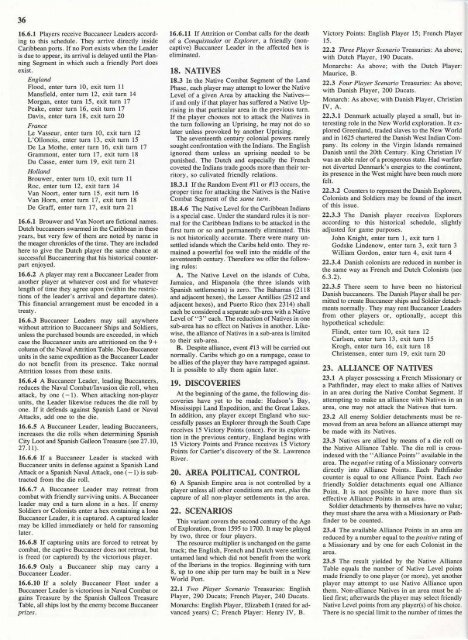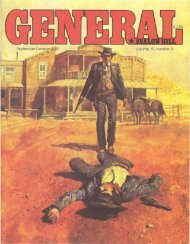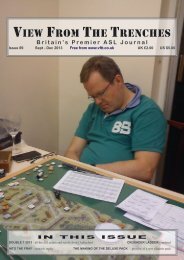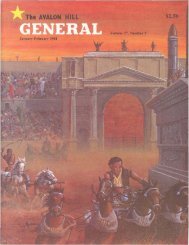general - View From The Trenches
general - View From The Trenches
general - View From The Trenches
- TAGS
- trenches
- www.vftt.co.uk
You also want an ePaper? Increase the reach of your titles
YUMPU automatically turns print PDFs into web optimized ePapers that Google loves.
36<br />
16.6.1 Players receive Buccaneer Leaders according<br />
to this schedule. <strong>The</strong>y arrive directly inside<br />
Caribbean ports. If no Port exists when the Leader<br />
is due to appear, its arrival is delayed until the Planning<br />
Segment in which such a friendly Port does<br />
exist.<br />
England<br />
Flood, enter turn 10, exit turn II<br />
Mansfield, enter turn 12, exit turn 14<br />
Morgan, enter turn IS, exit turn 17<br />
Peake, enter turn 16, exit turn 17<br />
Davis, enter turn 18, exit turn 20<br />
France<br />
Le Vasseur, enter turn 10, exit turn 12<br />
L'Ollonois, enter turn 13, exit turn IS<br />
De La Mothe, enter turn 16, exit turn 17<br />
Grammont, enter turn 17, exit turn 18<br />
Du Casse, enter turn 19, exit turn 21<br />
Holland<br />
Brouwer, enter turn 10, exit turn 11<br />
Roc, enter turn 12, exit turn 14<br />
Van Noort, enter turn IS, exit turn 16<br />
Van Horn, enter turn 17, exit turn 18<br />
De Graff, enter turn 17, exit turn 21<br />
16.6.1 Brouwer and Van Noort are fictional names.<br />
Dutch buccaneers swarmed in the Caribbean in these<br />
years, but very few of them are noted by name in<br />
the meager chronicles of the time. <strong>The</strong>y are included<br />
here to give the Dutch player the same chance at<br />
successful Buccaneering that his historical counterpart<br />
enjoyed.<br />
16.6.2 A player may rent a Buccaneer Leader from<br />
another player at whatever cost and for whatever<br />
length of time they agree upon (within the restrictions<br />
of the leader's arrival and departure dates).<br />
This financial arrangement must be encoded in a<br />
treaty.<br />
16.6.3 Buccaneer Leaders may sail anywhere<br />
without attrition to Buccaneer Ships and Soldiers,<br />
unless the purchased bounds are exceeded, in which<br />
case the Buccaneer units are attritioned on the 9 +<br />
column ofthe Naval Attrition Table. Non-Buccaneer<br />
units in the same expedition as the Buccaneer Leader<br />
do not benefit from its presence. Take normal<br />
Attrition losses from these units.<br />
16.6.4 A Buccaneer Leader, leading Buccaneers,<br />
reduces the Naval Combat/Invasion die roll, when<br />
attack, by one (-I). When attacking non-player<br />
units, the Leader likewise reduces the die roll by<br />
one. If it defends against Spanish Land or Naval<br />
Attacks, add one to the die.<br />
16.6.5 A Buccaneer Leader, leading Buccaneers,<br />
increases the die rolls when determining Spanish<br />
City Loot and Spanish Galleon Treasure (see 27.10,<br />
27.11).<br />
16.6.6 If a Buccaneer Leader is stacked with<br />
Buccaneer units in defense against a Spanish Land<br />
Attack or a Spanish Naval Attack, one (-1) is subtracted<br />
from the die roll.<br />
16.6.7 A Buccaneer Leader may retreat from<br />
combat with friendly surviving units. A Buccaneer<br />
leader may end a turn alone in a hex. If enemy<br />
Soldiers or Colonists enter a hex containing a lone<br />
Buccaneer Leader, it is captured. A captured leader<br />
may be killed immediately or held for ransoming<br />
later.<br />
16.6.8 If capturing units are forced to retreat by<br />
combat, the captive Buccaneer does not retreat, but<br />
is freed (or captured) by the victorious player.<br />
16.6.9 Only a Buccaneer ship may carry a<br />
Buccaneer Leader.<br />
16.6.10 If a solely Buccaneer Fleet under a<br />
Buccaneer Leader is victorious in Naval Combat or<br />
gains Treasure by the Spanish Galleon Treasure<br />
Table, all ships lost by the enemy become Buccaneer<br />
prizes.<br />
16.6.11 If Attrition or Combat calls for the death<br />
of a Conquistador or Explorer, a friendly (noncaptive)<br />
Buccaneer Leader in the affected hex is<br />
eliminated.<br />
18. NATIVES<br />
18.3 In the Native Combat Segment of the Land<br />
Phase, each player may attempt to lower the Native<br />
Level of a given Area by attacking the Nativesif<br />
and only if that player has suffered a Native Uprising<br />
in that particular area in the previous turn.<br />
If the player chooses not to attack the Natives in<br />
the turn following an Uprising, he may not do so<br />
later unless provoked by another Uprising.<br />
<strong>The</strong> seventeenth century colonial powers rarely<br />
sought confrontation with the Indians. <strong>The</strong> English<br />
ignored them unless an uprising needed to be<br />
punished. <strong>The</strong> Dutch and especially the French<br />
coveted the Indians trade goods more than their territory,<br />
so culivated friendly relations.<br />
18.3.1 If the Random Event #11 or #13 occurs, the<br />
proper time for attacking the Natives is the Native<br />
Combat Segment of the same tum.<br />
18.4.6 <strong>The</strong> Native Level for the Caribbean Indians<br />
is a special case. Under the standard rules it is normal<br />
for the Caribbean Indians to be attacked in the<br />
first turn or so and permanently eliminated. This<br />
is not historically accurate. <strong>The</strong>re were many unsettled<br />
islands which the Caribs held onto. <strong>The</strong>y remained<br />
a powerful foe well into the middle of the<br />
seventeenth century. <strong>The</strong>refore we offer the following<br />
rules:<br />
A. <strong>The</strong> Native Level on the islands of Cuba,<br />
Jamaica, and Hispanola (the three islands with<br />
Spanish settlements) is zero. <strong>The</strong> Bahamas (2118<br />
and adjacent hexes), the Lesser Antillies (2512 and<br />
adjacent hexes), and Puerto Rico (hex 2314) shall<br />
each be considered a separate sub-area with a Native<br />
Level of "3" each. <strong>The</strong> reduction ofNatives in one<br />
sub-area has no effect on Natives in another. Likewise,<br />
the alliance of Natives in a sub-area is limited<br />
to their sub-area.<br />
B. Despite alliance, event #13 will be carried out<br />
normally. Caribs which go on a rampage, cease to<br />
be allies of the player thay have rampaged against.<br />
It is possible to ally them again later.<br />
19. DISCOVERIES<br />
At the beginning of the game, the following discoveries<br />
have yet to be made: Hudson's Bay,<br />
Mississippi Land Expedition, and the Great Lakes.<br />
In addition, any player except England who successfully<br />
passes an Explorer through the South Cape<br />
receives 15 Victory Points (once). For its exploration<br />
in the previous century, England begins with<br />
15 Victory Points and France receives IS Victory<br />
Points for Cartier's discovery of the St. Lawrence<br />
River.<br />
20. AREA POLITICAL CONTROL<br />
6) A Spanish Empire area is not controlled by a<br />
player unless all other conditions are met, plus the<br />
capture of all non-player settlements in the area.<br />
22. SCENARIOS<br />
This variant covers the second century ofthe Age<br />
of Exploration, from 1595 to 1700. It may be played<br />
by two, three or four players.<br />
<strong>The</strong> resource multiplier is unchanged on the game<br />
track; the English, French and Dutch were settling<br />
untamed land which did not benefit from the work<br />
of the Iberians in the tropics. Beginning with turn<br />
8, up to one ship per turn may be built in a New<br />
World Port.<br />
22.1 Two Player Scenario Treasuries: English<br />
Player, 290 Ducats; French Player, 240 Ducats.<br />
Monarchs: English Player, Elizabeth I (rated for advanced<br />
years) C; French Player: Henry IV, B.<br />
Victory Points: English Player IS; French Player<br />
IS.<br />
22.2 Three Player Scenario Treasuries: As above;<br />
with Dutch Player, 190 Ducats.<br />
Monarchs: As above; with the Dutch Player:<br />
Maurice, B.<br />
22.3 Four Player Scenario Treasuries: As above;<br />
with Danish Player, 200 Ducats.<br />
Monarch: As above; with Danish Player, Christian<br />
IV, A.<br />
22.3.1 Denmark actually played a small, but interesting<br />
role in the New World exploration. It explored<br />
Greenland, traded slaves to the New World<br />
and in 1625 chartered the Danish West Indian Company.<br />
Its colony in the Virgin Islands remained<br />
Danish until the 20th Century. King Christian IV<br />
was an able ruler ofa prosperous state. Had warfare<br />
not diverted Denmark's energies to the continent,<br />
its presence in the West might have been much more<br />
felt.<br />
22.3.2 Counters to represent the Danish Explorers,<br />
Colonists and Soldiers may be found of the insert<br />
of this issue.<br />
22.3.3 <strong>The</strong> Danish player receives Explorers<br />
according to this historical schedule, slightly<br />
adjusted for game purposes.<br />
John Knight, enter turn I, exit turn I<br />
Godske Lindenow, enter turn 3, exit turn 3<br />
William Gordon, enter turn 4, exit turn 4<br />
22.3.4 Danish colonists are reduced in number in<br />
the same way as French and Dutch Colonists (see<br />
6.3.2).<br />
22.3.5 <strong>The</strong>re seem to have been no historical<br />
Danish buccaneers. <strong>The</strong> Danish Player shall be permitted<br />
to create Buccaneer ships and Soldier detachments<br />
normally. <strong>The</strong>y may rent Buccaneer Leaders<br />
from other players or, optionally, accept this<br />
hypothetical schedule:<br />
Flindt, enter turn 10, exit turn 12<br />
Carlsen, enter turn 13, exit turn IS<br />
Krogh, enter turn 16, exit turn 18<br />
Christensen, enter turn 19, exit turn 20<br />
23. ALLIANCE OF NATIVES<br />
23.1 A player possessing a French Missionary or<br />
a Pathfinder, may elect to make allies of Natives<br />
in an area during the Native Combat Segment. If<br />
attempting to make an alliance with Natives in an<br />
area, one may not attack the Natives that turn.<br />
23.2 All enemy Soldier detachments must be removed<br />
from an area before an alliance attempt may<br />
be made with its Natives.<br />
23.3 Natives are allied by means of a die roll on<br />
the Native Alliance Table. <strong>The</strong> die roll is crossindexed<br />
with the "Alliance Points" available in the<br />
area. <strong>The</strong> negative rating of a Missionary converts<br />
directly into Alliance Points. Each Pathfinder<br />
counter is equal to one Alliance Point. Each two<br />
friendly Soldier detachments equal one Alliance<br />
Point. It is not possible to have more than six<br />
effective Alliance Points in an area.<br />
Soldier detachments by themselves have no value;<br />
they must share the area with a Missionary or Pathfinder<br />
to be counted.<br />
23.4 <strong>The</strong> available Alliance Points in an area are<br />
reduced by a number equal to the positive rating of<br />
a Missionary and by one for each Colonist in the<br />
area.<br />
23.5 <strong>The</strong> result yielded by the Native Alliance<br />
Table equals the number of Native Level points<br />
made friendly to one player (or more), yet another<br />
player may attempt to use Native Alliance upon<br />
them. Non-alliance Natives in an area must be allied<br />
first; afterwards the player may select friendly<br />
Native Level points from any player(s) ofhis choice.<br />
<strong>The</strong>re is no special limit to the number of times the
















